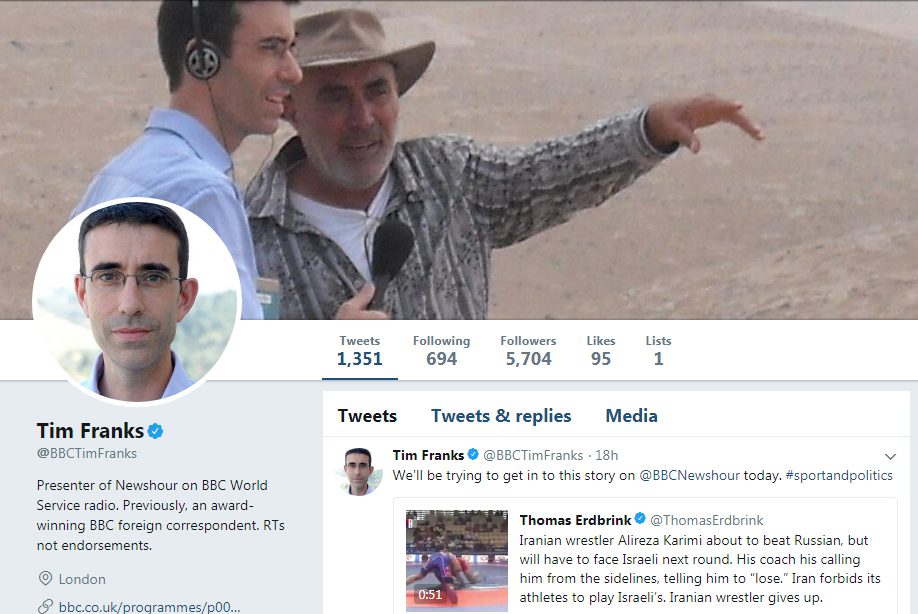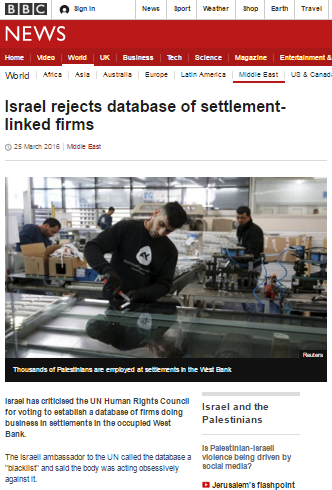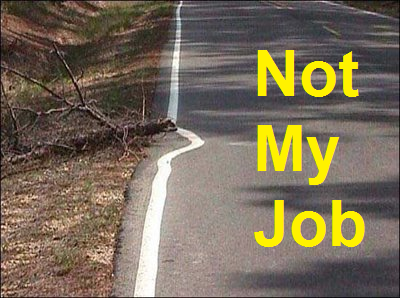A filmed report by James Reynolds dating from July 7th which appeared on BBC television news broadcasts was also promoted on the BBC News website’s Middle East page under the title “Israeli air strikes on Gaza kill nine Palestinian militants“.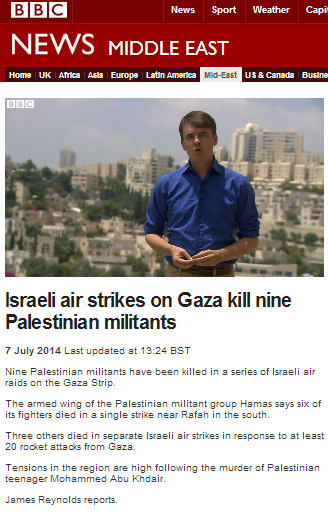
In the synopsis to that item as it appears on the website, no mention is made of the cause of Israeli airstrikes on terrorist infrastructure in the Gaza Strip: the firing of hundreds of missiles at Israeli civilian targets by Palestinian terrorists. However, the synopsis does promote the inaccurate notion that “tensions” in the area are related to the murder of Muhammed Abu Khdeir, when in fact the surge in missile attacks from the Gaza Strip began four weeks ago.
“Nine Palestinian militants have been killed in a series of Israeli air raids on the Gaza Strip.
The armed wing of the Palestinian militant group Hamas says six of its fighters died in a single strike near Rafah in the south.
Three others died in separate Israeli air strikes in response to at least 20 rocket attacks from Gaza.
Tensions in the region are high following the murder of Palestinian teenager Mohammed Abu Khdair.”
Reynolds opens his report:
“Overnight, Israel’s air-force struck targets in Gaza: the piece of land ruled by the Palestinian armed movement Hamas.”
In addition to the absence of any mention of the fact that Hamas is a designated terrorist organization and the euphemistic description of it as an “armed movement”, it is also notable that Reynolds inaccurately tells BBC audiences that the Gaza Strip is “ruled by” Hamas when in fact, since June 2nd 2014, it is officially under the authority of the Palestinian unity government which is a product of the reconciliation agreement between Hamas and Fatah. Notably, that aspect of the current Gaza Strip story is being consistently erased from public view by the BBC.
Reynolds goes on with that old BBC favourite “Israel says”, which of course translates as ‘we’re not going to confirm that’.
“Israel says it went after rocket launcher sites and warehouses. Israel’s airstrikes killed a number of armed men from Hamas and other groups. This was the deadliest attack on Gaza since 2012.”
In fact, some of those terrorists (rather than “armed men” as Reynolds euphemistically calls them) were killed because they were handling their own explosives in a cross-border tunnel at the time of their death.
“The IDF targeted a Hamas tunnel early Monday morning, preventing an imminent terror threat to Israeli citizens. Hamas terrorists built the tunnel, which extends from Gaza into Israel, in order to execute complex attacks against civilians and IDF soldiers.
At the time of the strike, terrorists inside the tunnel were working with explosives, causing a massive blast that killed seven Hamas operatives. The terrorists likely planned to use the explosives to carry out an attack against Israel.”
Reynolds continues:
“This morning a rocket fired by Hamas landed in the Israeli village of Nirim next to Gaza. In recent days Hamas has fired several dozen of its own crudely made rockets across the border.”
Reynolds’ description of the missiles fired as “crudely made” is obviously attempt to portray them to BBC audiences as ineffective and to downplay the danger they present. Some of Hamas’ approximately 10,000 strong missile arsenal is indeed locally produced: the M75, for example, with its 60 kg warhead and 75 km range, was responsible for the deaths of three people in the apartment shown in the picture below in 2012.
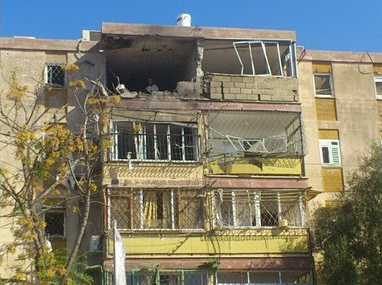
The report then cuts to a brief two-sentence interview with the Israeli spokesman Mark Regev:
“We are acting to protect our people. We are targeting the terrorists in Gaza – those firing the rockets – and Hamas has to understand: this must stop.”
Reynolds goes on to promote a deft reversal of the actual situation, prompting audiences to mistakenly believe that Hamas is responding to Israeli actions rather than – as is actually the case – the opposite.
“Israel’s strikes on Gaza have prompted Hamas to promise further attacks of its own.”
He continues, downplaying the gravity of the fact that over a million people have had their lives paralysed by missile attacks from terrorist organisations for four weeks and describing organized violent rioting as ‘protest’.
“Fighting between Israel and Hamas in Gaza has been a regular part of this conflict. But what may worry Israel more is the atmosphere here in Jerusalem and in nearby areas. Palestinians who live under Israeli rule have protested and they’ve fought against the police.”
The report then cuts to footage of Saeb Erekat.
“This morning the Palestinian chief negotiator Saeb Erekat took diplomats to see the village of Nabi Samuel. It’s surrounded by Jewish settlements built on land the Palestinians want for a state.”
Not for the first time we see BBC reporters making inaccurate use of the words “surrounded” and “settlements” in the same sentence. Below is a map of Nabi Samuel with Israeli residential areas marked in blue and Palestinian ones in green. As readers can see for themselves, “surrounded by Jewish settlements” is an inaccurate portrayal.

Erekat then says:
“What we are witnessing of this wave of escalation is a systematic approach by the Israeli government to throw us in the path of bloodshed, violence, counter-violence, chaos which we have seen in 2002.”
Erekat’s reference to 2002 is of course intended to mean Operation Defensive Shield, which was preceded and brought about by eighteen months of Palestinian terrorism initiated by the Palestinian Authority which Erekat ‘neglects’ to mention and Reynolds fails to clarify to audiences. Neither does Reynolds inform viewers that had the PA not elected to start the second Intifada terror war against Israel, negotiations could have continued and the PA could have got the land it ‘wants’ for its state. Notably, the BBC did not take the opportunity to ask Erekat what the Palestinian unity government (bound, according to its own prime minister, to existing agreements with Israel) is doing to stop Hamas missile fire on Israeli civilians from a territory which has been under its authority since June 2nd.
Reynolds closes by again promoting the notion of organized violent rioting as “protests”, erasing the political motivations which lie behind it from audience view and instead advancing a patronizing theory of “anger”.
“In the north of Israel, Arabs who have Israeli citizenship have clashed with the police. These protests are more unusual. They’re a sign of increasing anger in this conflict.”
As readers have no doubt noticed, the BBC’s sporadic and incomplete coverage of the last four weeks of missile attacks on Israeli civilians has not included much effort to convey to BBC audiences what it is like for those one million residents located close to the Gaza Strip to live under ever-escalating terror attacks for weeks on end. To date, since this latest round of augmented attacks began, BBC audiences have seen just one brief one-liner interview with one man in one report – and James Reynolds did nothing to correct that imbalance in this piece.


